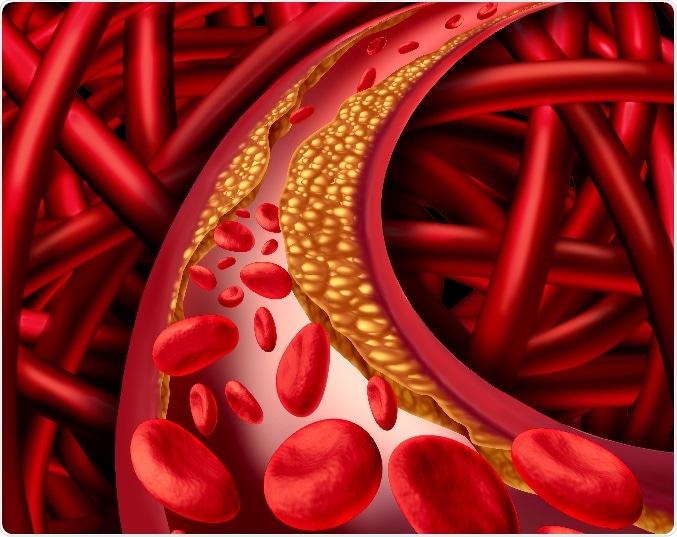Jun 20 2017
In people with high cholesterol levels, the fat that is built up in the artery walls narrows the arteries causing a condition called atherosclerosis. A study published on 19th June in the European Heart Journal has found the likelihood of a vaccine that can immunize humans having atherosclerosis, subsequent to successful outcomes in a mouse model study. At present, phase I clinical trial has begun in patients to see the possibility of translating the study findings to humans.
 Credit: Lightspring/Shutterstock.com
Credit: Lightspring/Shutterstock.com
The research is the first to show the possibility of immunizing genetically modified mice with a molecule that makes the body produce antibodies against Proprotein covertase subtilisin/kexin type 9 (PCSK9), an enzyme that stops the clearance of low density lipoprotein (LDL) cholesterol from the blood.
Individuals with LDL cholesterol at higher levels either inherited genetically or due to poor diet or lifestyle, are at a great risk of developing heart disease early. Across the globe, diseases caused by atherosclerosis–heart and blood vessel diseases—have overtaken other infections as the major cause of illness and death. Currently, drugs are available for lowering LDL cholesterol, but patients need to consume them daily.
Although these drugs are well tolerated in general, in some individuals they can cause adverse effects such as rise in new onset diabetes, in particular. Monoclonal antibodies that target PCSK9, the most recently approved compounds that reduce cholesterol, are very effective, yet they have short-term effects that result in reapplication and are of higher cost.
The mice in the study were fed with Western-style fatty food in order to induce high cholesterol and develop atherosclerosis. When the vaccine AT04A was injected under the skin, the cholesterol levels in the mice were reduced by 53%.
The study shows that atherosclerotic damage was reduced by 64% in the blood vessels. When compared with the mice that were not vaccinated, the vaccinated mice showed a 21–28% reduction of biological markers of blood vessel inflammation. Moreover, the antibodies induced were functional throughout the course of study and their concentrations remained high till completion of the study.
Dr Günther Staffler, chief technology officer of the company that developed AT04A and one of the authors of the study, said:
AT04A was able to induce antibodies that specifically targeted the enzyme PCSK9 throughout the study period in the circulation of the treated mice. As a consequence, levels of cholesterol were reduced in a consistent and long-lasting way, resulting in a reduction of fatty deposits in the arteries and atherosclerotic damage, as well as reduced arterial wall inflammation.”
PCSK9–the enzyme made in the liver locks the receptors of LDL cholesterol and decreases their capability to clear LDL cholesterol from the blood. Upon injecting AT04A, the activity of the receptors of LDL cholesterol increases as the antibodies blocking the function of PCSK9 is produced in the body.
"The way that AT04A is administered is comparable to a vaccine," explained Dr Staffler. "However, the difference between a conventional vaccine and our approach is that a vaccine induces antibodies that are specific to bacterial or viral proteins that are foreign to the body - pathogens - whereas AT04A induces antibodies against a target protein that is produced by the body - endogenous proteins. This it is really an immunotherapeutic approach rather than a vaccine approach."
The phase I clinical study was started in 2015 in the Department of Clinical Pharmacology, Medical University of Vienna, Austria, to study AT04A and AT06A, another molecule. The study conducted on 72 healthy people for assessing its safety and activity is expected to be completed by the end of 2017.
In an editorial that accompanied the study, Professor Ulrich Laufs of Saarland University, Germany, and Professor Brian Ference of the University of Bristol, UK, and the Wayne State University School of Medicine, Detroit, USA, wrote: "It appears promising to further evaluate long-term LDL cholesterol lowering by vaccination against PCSK9 for the prevention of atherosclerotic events."
They added, "safety, the response in humans and the very important but unknown long-term immune effects need to be very carefully addressed during the course of clinical development".